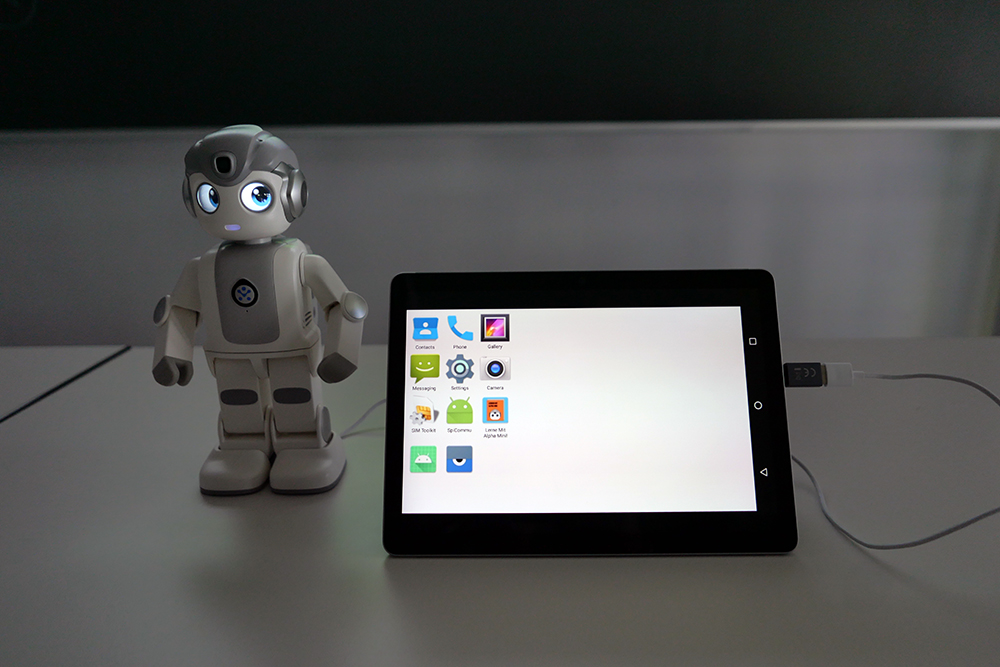An elevator is still a bit of a problem for a service robot. A first approach is to use social features such as facial expressions and sounds. The user trusts the machine or feels sorry for it and helps it into the lift. A second option is for the robot to press the right buttons with its gripper. However, this can be very difficult and can also cause problems, for example when people are present. A third option is for the robot and the elevator to communicate via appropriate interfaces. This is certainly the most elegant solution, but it requires some technical standardisation and upgrading. As reported by the Korea Economic Daily, KT, LG Elec, and Hyundai Elevator have joined forces in the “robot-elevator project”. The vision is described in the teaser as follows: “A robot freely gets on and off an elevator and moves around a building, doing everything from coffee to parcel delivery and route guidance.” (KED, 28 July 2023) About the plans of the three companies, the magazine says: “The three will jointly plan and search for elevator-robot linkage services, con-duct cooperation to secure competitiveness in robotics services and look for new business lines. KT and LG Electronics said a far more competitive system of robotics services is possible by linking an elevator to a robot since robots must freely move between floors to increase their utility.” (KED, 28 July 2023) More information is available at www.kedglobal.com/robotics/newsView/ked202307280005.
Disabling Autonomous Vehicles
“Anti-car activists have come up with a novel and effective way of disabling driverless vehicles owned by Waymo and Cruise in San Francisco: placing traffic cones on their hoods. It’s the work of a group called Safe Streets Rebel, which has launched a protest dubbed ‘Week of Cone’.” (Techspot, 11 July 2023) This was reported by Techspot on 11 July 2023. Prof. Dr. Oliver Bendel has been pointing out for several years that automated and autonomous cars can be crippled in a simple way. On 6 March 2018, in an article in a Swiss IT journal, he asked, “Does autonomous driving fail because of manipulated sensors?” … A thesis by his student M. Hashem Birahjakli then systematically compiled and examined methods and means. A blog post about it states: “The results of the work suggest that every 14-year-old girl or boy could disable a self-driving car. So far, hacking has been seen as the greatest threat to autonomous driving. But while not everyone can hack, almost everyone carries chewing gum or lipstick. The automotive industry should consider this threat seriously.” The operator Waymo reacts helplessly to the actions. According to the German magazine Golem, a press spokesman emphasized that the traffic cone action shows a lack of understanding of how autonomous vehicles work and is vandalism. In fact, the activists know very well how autonomous vehicles work. And that is precisely the problem.
Little, Great Teacher
July 14, 2023 was the final presentation of the “Little Teacher” project, in which Alpha Mini plays a leading role. The initiator was Prof. Dr. Oliver Bendel, who has been researching conversational agents and social robots for a quarter of a century. Andrin Allemann contributed to the project as part of his thesis and carried out the implementation. In this application, Alpha Mini is intended for school or learning in a child’s room. It was connected to a tablet or laptop (a Microsoft Surface). It can teach simple learning material on geography and biology with the help of pictures and text on the display, and motivate children through verbal, gestural, and mimic feedback. It is therefore a small teacher with great possibilities. Alpha Mini is a social robot characterized by small size (and thus good transportability) and extensive natural language and motor skills. It is much less expensive than other humanoid robots with comparable capabilities. However, unlike Pepper, it does not have an integrated tablet. The project showed that it is possible to connect different components of a learning environment and to support learning success and learning enjoyment. The project was launched on March 8, 2023. Project completion is August 11, 2023. Until then, minor bugs will be fixed and several tests will be performed. The results will be published in a paper.
@llegra, a Chatbot for Vallader
Conversational agents have been a research subject of Prof. Dr. Oliver Bendel for a quarter of a century. He dedicated his doctoral thesis at the University of St. Gallen to them. At the School of Business FHNW, he developed them with his changing teams from 2012 to 2022, primarily in the context of machine ethics and social robotics. The philosopher of technology now devotes himself increasingly to dead, extinct, and endangered languages. After @ve (2022), a chatbot for Latin based on GPT-3, another project started in March 2023. The chatbot @llegra is developed by Dalil Jabou for the Rhaeto-Romanic idiom Vallader, which occurs in the Lower Engadine between Martina in the northeast and Zernez in the southwest, as well as in Val Müstair. The user can type text and gets text output. In addition, @llegra speaks with the help of a text-to-speech system from the company SlowSoft, which supports the project. The GPT-3 speech model produced rather unsatisfactory results. The breakthrough then came with the use of GPT-4. The knowledge base was supplemented with the help of four children’s books on Vallader. The project will be completed in August 2023. The results will be published thereafter.



